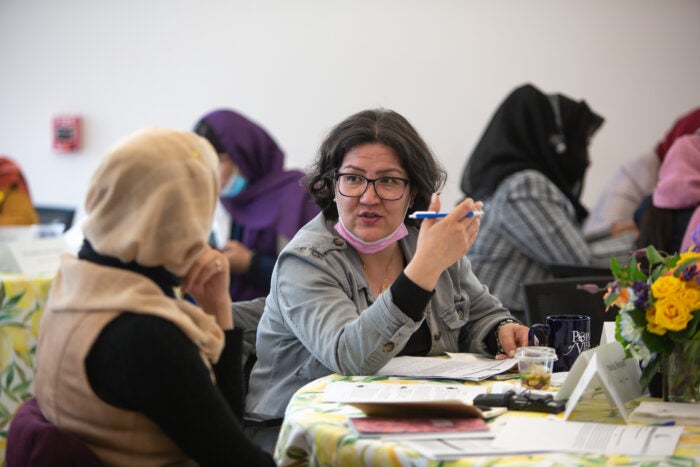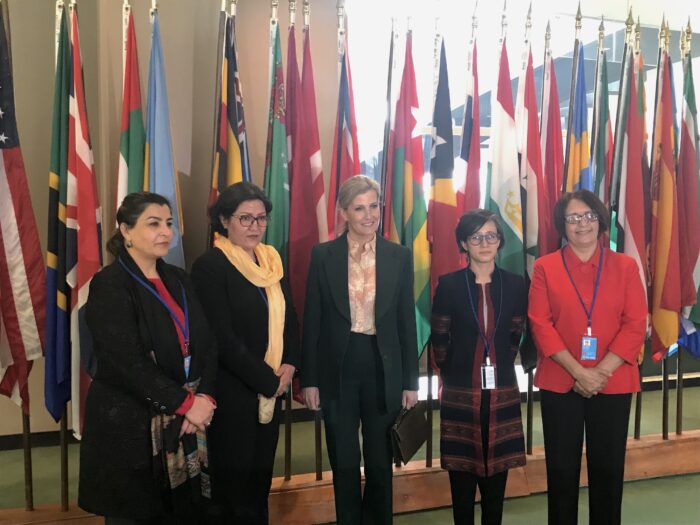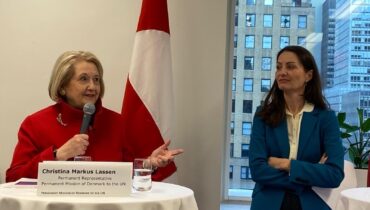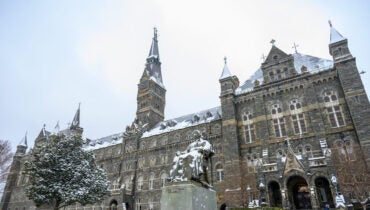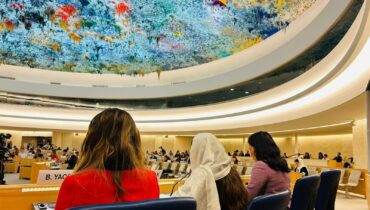EVACUATED AFGHAN WOMEN LEADERS PLANT ROOTS WITH U.S. UNIVERSITIES
The Georgetown Institute for Women, Peace and Security (GIWPS) successfully matched 16 Afghan women with fellowships and job opportunities in academic institutions across the United States since the fall of 2021.
“With the return of the Taliban, Afghanistan’s best and brightest became a target in their own land,” said Allida Black, GIWPS affiliated scholar. “We wanted to ensure Afghan women’s wisdom wasn’t lost and find a way for them to share their skills and courage with Americans, so we developed a consortium of institutions that could host Afghan fellows and build networks to address their resettlement needs.”
A team at GIWPS, including Black, Sarah Rutherford, Carla Koppell, Alicia Burke and Jessica Smith, led the matchmaking effort, identifying opportunities and reaching out directly to Afghan women. Taking into account each leader’s unique expertise and resettlement needs, GIWPS colleagues connected Afghan women with institutions and employers that expressed interest in hosting them.
GIWPS was not alone in this effort. Private organizations like Bank of America stepped up to provide financial support for fellowships for Afghan leaders.
By joining leading U.S. academic institutions, each woman making up the Onward for Afghan Women network laid a new path for continuing her work and serving her community.
These are just three of their stories.
“WITHOUT BEING A LAWYER YOU CANNOT CHALLENGE LAWLESSNESS”
Humaira Rasuli is a prominent human rights lawyer who founded and led a legal aid NGO working to defend human rights and improve institutional accountability through public litigation. Rasuli and her organization investigated numerous high-profile cases, including exposing sexual violence and child sexual exploitation in various institutions.
“Without being a lawyer, you cannot change lawlessness,” she said, recalling her pivotal decision to quit the medical faculty in college to her family’s dismay, and to become a lawyer.
When she evacuated to the U.S. in August 2021, Rasuli spent six months at a military base in Wisconsin awaiting resettlement with her husband and two children. GIWPS connected her with the William & Mary Law School, which invited her to join the university as a visiting scholar specializing in legal writing and civil and comparative law.
In addition to William & Mary welcoming Rasuli as a scholar, the local community in Williamsburg rallied to sponsor her and her family through the Sponsor Circle Program, an initiative that paired newly arrived Afghans with American citizens or groups willing to provide temporary financial support during the first three months of resettlement.
“Humaira, a very accomplished human rights lawyer in her own right, has embraced the challenges which she encountered with grace and unwavering commitment to continue her human rights work,” said Iria Giuffrida, director of the LLM program at William & Mary Law School. “Humaira’s presence has enriched our community, which I want to thank for their boundless generosity, support, and care.”
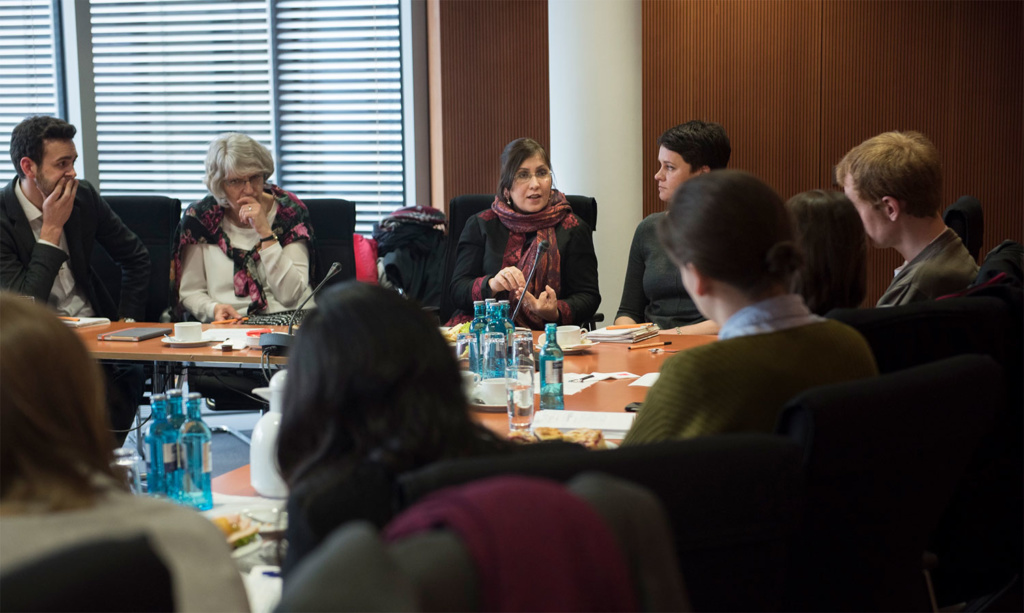
Humaira Rasuli
Rasuli says that the support and warm reception she received at William & Mary has been tremendous. The university provides access to law school facilities, and social workers are readily available to assist with resettlement paperwork.
When Rasuli’s family first arrived in Williamsburg from the military base, her husband, who is a physician, marveled: “We went first through hell, and now we come to paradise.”
For now, she continues advocating for Afghan women from the U.S. Rasuli helps Afghan NGO workers and activists with resettlement and evacuation applications, remotely teaches Afghan law students, continues to advocate for women’s rights, and builds networks of women human rights leaders.
“This is for me not a job, this is a real commitment,” Rasuli said, reflecting on the strain that her tireless advocacy work puts on her well-being. “I don’t know what part of my work I could quit. This [situation in Afghanistan] is something unacceptable. Especially the [denial of] fundamental rights of women to education and work. It’s something that we will never give up on.”
A NEW GENERATION OF AFGHANS, A SOURCE OF HOPE
Fighting against discrimination has always been at the heart of Yalda Royan’s work.
A champion for gender equality and minority rights in the international development sector, she has been working at the Office of Diversity, Equity and Inclusion at the Northern Virginia (NOVA) Community College since her resettlement.
“We weren’t prepared for it,” Royan said of her evacuation from Afghanistan. “It’s not just that you change a home or a city. You left everything, you lost everything, and then came to live in a new country [that] you don’t know anything about. And it was a big transition for us.”
Soon after Royan arrived in the United States, she received a call from Rutherford at GIWPS, offering to connect her with Dr. Nathan Carter, NOVA’s chief diversity, equity and inclusion officer and her future boss.
“Yalda has been a great help in many ways,” Dr. Carter reflected. “She has provided assistance and leadership improving staff’s understanding of ways to perform outreach activities to communities who may feel intimidated about entering institutions of higher education. Her global perspective has extended our efforts to meet inclusive excellence goals.”
Yalda Royan advocating for Afghan women post-evacuation.
Working on community engagement in the DEI office was a great fit for Royan’s expertise. “It’s very similar to the work I was doing in Afghanistan,” she explained. “There, we were only fighting for women. And here we are fighting for a lot of other aspects. Because I come from an ethnic background that has always faced discrimination, this is a job that fits my background very well.”
In Afghanistan, Royan served as a deputy chief of the largest USAID-funded program for Afghan women, worked in the government, and acted as a consultant to major international organizations including UN Women, the World Bank, and VOICE Amplified.
At NOVA Community College, Royan fosters partnerships with community-based organizations and provides support to students who face barriers in accessing education. In addition, NOVA’s administration takes a keen interest in engaging with the local Afghan community—especially students. Royan leads the DEI office’s work in this community, sharing information and planning ESL courses for new arrivals from Afghanistan.
“NOVA has a mission focused on serving the community around the college, and newly arrived Afghans are an important part of our local community,” said Dr. Carter. “Yalda has helped by assisting in NOVA’s ability to establish stronger and trusted relationships with local nonprofits who serve the Afghan community directly.”
Her work at the NOVA community college has been fulfilling, but for Royan, advocating for the rights of Afghan women and girls remains a full-time endeavor. She continues to speak out against Taliban-perpetrated atrocities, testifying before the United Nations about the human rights crisis in Afghanistan, engaging with the media, and consulting with VOICE Amplified.
Royan dreams of a day when there is no more Taliban rule, so that she can go back and serve her country.
“The generation [of Afghans] that has grown up in the last 20 years, they are not used to what is happening [to them] right now,” Royan said. “They will stand against what is happening. That’s what is making me hopeful.”
THE UNFINISHED BUSINESS OF AFGHAN WOMEN
“I am physically here,” Naheed Farid reflected from her home in Maryland. “But my mind is still in Afghanistan. My soul is there.”
Farid was the youngest-ever member of Afghanistan’s parliament, representing the city of Herat. She led the charge on advancing women’s rights by authoring and sponsoring important legislation, including laws to safeguard children’s rights, tackle violence against women, and extend equal citizenship rights to women and men.
Today Farid is part of the newly launched SPIA Afghanistan Policy Lab at Princeton University, which produces policy research on humanitarian aid, human rights, and national reconciliation in Afghanistan.
“I don’t look at that as a job,” said Farid. “This is the platform for Afghan women to write a new chapter of the women’s rights movement in the history of Afghanistan.”
As a high-profile politician, Farid fled Afghanistan fearing retribution from the Taliban. She secured her position at Princeton with the support of GIWPS Executive Director Melanne Verveer who got in touch after Farid’s evacuation.
“When I came to the United States, I was traumatized, understanding the fact that personally and professionally, I have nothing,” Farid reflected. “The Georgetown community, Ambassador Verveer, the Afghan community…they all started communicating with me about what has happened and how they can help.”
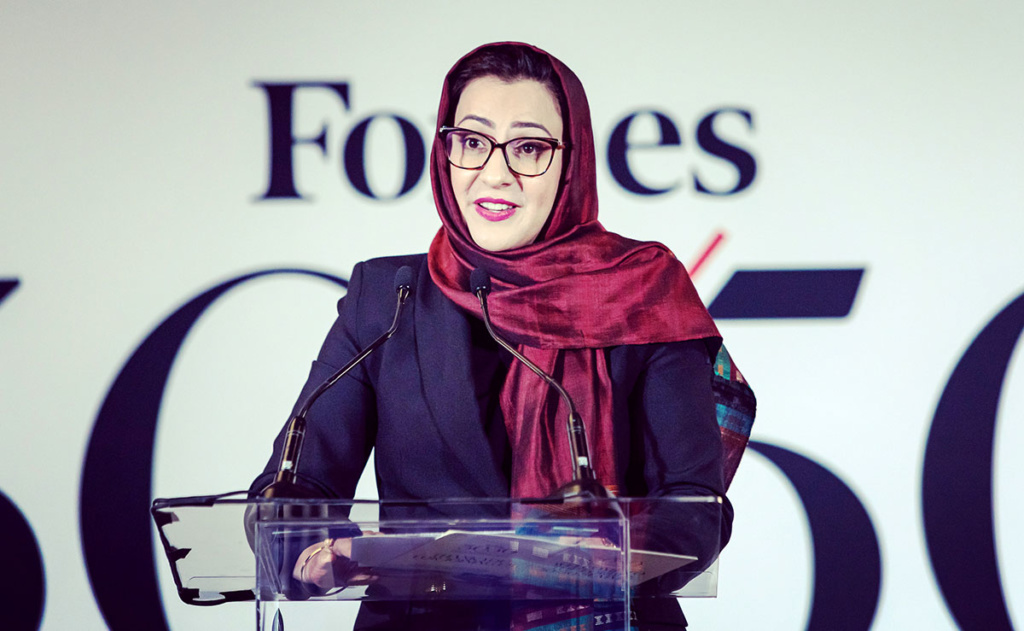
Joining the Afghanistan Policy Lab in Princeton allowed Farid to apply her decade of governing experience to influencing U.S. policymakers.
“Finding a job that is related to Afghanistan [and] can be impactful for the people of Afghanistan and for the women of Afghanistan, like the job that I have at Princeton, is something that is really giving me a lot of energy to move forward,” Farid said of her role. “This gave me hope.”
“The Afghan fellows are the important authentic voices for Afghan policies and our fellows at the APL, an important initiative led by Dean Jamal Amaney, are a vital addition to this arena,” said Adela Raz, Director of the Afghanistan Policy Lab at the Princeton School of Public and International Affairs. “Ms. Farid’s work in the Afghan Parliament has given her a unique perspective about Afghan politics. She also brings experience of working with her constituents, knowing the day-to-day challenges of Afghan society and illustrating their rightful concerns.”
On International Women’s Day 2022, Farid together with Zarifa Ghafari received the Forbes Changemaker Award, in recognition of her effort to remove barriers to active civic participation for Afghan women. Advancing women’s rights was always central to Farid’s work as a public servant, and with the return of the Taliban, it became her “unfinished business.”
“Women of Afghanistan earned their freedom,” Farid explained. “It was not inherited. They earned their freedom, they fought for it. When you earn [something], you don’t give it up.”
